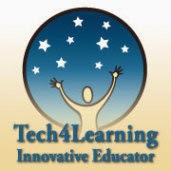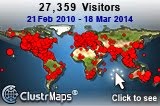 I love Shelfari, a social networking site for readers. I am an avid reader, but not a big collector of physical books. I don't have an ereader; I do read books. However, I get a lot of my reads from the public library or borrowed from friends. If I do buy a book and love it, the first thing I usually do is pass it on to someone else I think will enjoy it. Therefore, my bookshelves do not represent my life as a reader. Enter Shelfari. Now, I can have the pleasure of a beautiful bookshelf to display my books. It helps me remember what I have read and when, what I liked, what I loved.... If anyone else is interested in my reading, they can "friend" me and peruse my shelves. I have recently started including on my shelfari shelves the books I read aloud to my children, as well. I'm happy to have a way to remember those precious moments spent each night at bedtime, even after the physical books have made their way back to the library or shared with others.
I love Shelfari, a social networking site for readers. I am an avid reader, but not a big collector of physical books. I don't have an ereader; I do read books. However, I get a lot of my reads from the public library or borrowed from friends. If I do buy a book and love it, the first thing I usually do is pass it on to someone else I think will enjoy it. Therefore, my bookshelves do not represent my life as a reader. Enter Shelfari. Now, I can have the pleasure of a beautiful bookshelf to display my books. It helps me remember what I have read and when, what I liked, what I loved.... If anyone else is interested in my reading, they can "friend" me and peruse my shelves. I have recently started including on my shelfari shelves the books I read aloud to my children, as well. I'm happy to have a way to remember those precious moments spent each night at bedtime, even after the physical books have made their way back to the library or shared with others.I am a big believer in using authentic tools and processes to develop habits of literacy with students. One of my least favorite of all "schooly" inventions is the reading log. Real readers catalog and share their reading in a variety of ways, but I have yet to meet the adult reader who keeps a reading log showing how many pages read of a particular book at each reading session. I've even seen reading logs that require children to count how many words they've read and how many minutes they've engaged in reading. What real reader counts pages or minutes? It is ironic that an activity designed to help ignite a love of reading can be exactly what sucks the very life from it. Teachers looking for accountability have devised this tool with best intentions in mind, I am sure. However, as a parent I can tell you that the reading log, besides being inauthentic, is also difficult to maintain and provides no motivation or impetus for engagement. I know I could be fairly accused of being opinionated, however, it's not just me who has thoughts about reading logs. This post from a mom, titled "I Hate Reading Logs" garnered 692 comments!
Upgrading the Reading Log-
As an adult who loves to read, I also love Shelfari. This is the litmus test I use. If I find something motivating and engaging, if it is a genuine part of who I am as a reader, than I believe it is potentially useful for students who are developing their reading-selves and teachers who are helping them to do this. There are many possibilities for using Shelfari with students as a way to monitor what your students are reading outside of class. As an added bonus, Shelfari promotes the social aspects of reading, gives students a place to share with and learn from others, and helps students begin to understand that what they read is part of their identity.
How-to:
In order to create a shelfari account, students must have an email address.
Shelfari How To
Once your students have created their accounts, they can create and upload avatars, add friends and start exploring the site. In order to add friends, students should use the "advanced search" and type in the friend's email address. This is easy to do if you use school email addresses with a predictable format. Teachers can also experiment with creating groups and having students add certain books to the group shelf. Students and/or classes who blog have the very cool option to create a widget to post their Shelfari shelf on their blog. Creative teachers will find that there are many ways to adapt the tool for your students. Try things out, explore and have fun. Please share in the comments if you have good strategies, things to watch out for or any other thoughts about using Shelfari with students.
Shelfari How To
Once your students have created their accounts, they can create and upload avatars, add friends and start exploring the site. In order to add friends, students should use the "advanced search" and type in the friend's email address. This is easy to do if you use school email addresses with a predictable format. Teachers can also experiment with creating groups and having students add certain books to the group shelf. Students and/or classes who blog have the very cool option to create a widget to post their Shelfari shelf on their blog. Creative teachers will find that there are many ways to adapt the tool for your students. Try things out, explore and have fun. Please share in the comments if you have good strategies, things to watch out for or any other thoughts about using Shelfari with students.









